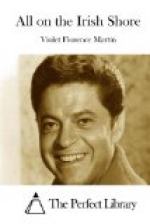In those days, before the inertia that creeps like mildew over country householders had begun to form, Mr. Denny was in the habit of making occasional excursions into remote parts of the County Cork in search of those flowers of pony perfection that are supposed to blush unseen in any sufficiently mountainous and unknown country, and the belief in which is the touch of wild poetry that keeps alive the soul of the amateur horse coper. He had never met the pony of his dreams, but he had not lost faith in it, and though he would range through the Bantry fair with a sour eye, behind the sourness there was ever a kindling spark of hope.
Towards the end of October, in the year ’83, Mr. Denny received an invitation from an old friend to go down to “the West”—thus are those regions east of the moon, and west of the sun, and south-west of Drimoleague Junction, designated in the tongue of Cork civilisation—to “look at a colt,” and with a saddle and bridle in the netting and a tooth-brush in his pocket he set his face for the wilderness. I have no time to linger over the circumstances of the deal. Suffice it to say that, after an arduous haggle, Mr. Denny bought the colt, and set forth the same day to ride him by easy stages to his future home.
It was a wet day, wet with the solid determination of a western day, and the loaded clouds were flinging their burden down on the furze, and the rocks, and the steep, narrow road, with vindictive ecstacy. They also flung it upon Mr. Denny, and both he and his new purchase were glad to find a temporary shelter in one of the many public-houses of a village on the line of march. He was sitting warming himself at an indifferent turf fire, and drinking a tumbler of hot punch, when the sound of loud voices outside drew him to the window. In front of a semi-circle of blue frieze coats, brown frieze trousers and slouched black felt hats, stood a dejected grey pony, with a woman at its head and a lanky young man on its back; and it was obvious to Mr. Denny that a transaction, of an even more fervid sort than that in which he had recently engaged, was toward.
“Fifteen pound!” screamed the woman, darting a black head on the end of a skinny neck out of the projecting hood of her cloak with the swiftness of a lizard; “fifteen pound, James Hallahane, and the divil burn the ha’penny less that I’ll take for her!”
The elderly man to whom this was addressed continued to gaze steadily at the ground, and turning his head slightly away, spat unostentatiously. The other men moved a little, vaguely, and one said in a tone of remote soliloquy:—
“She wouldn’t go tin pound in Banthry fair.”
“Tin pound!” echoed the pony’s owner shrilly. “Ah, God help ye, poor man! Here, Patsey, away home wid ye out o’ this. It’ll be night, and dark night itself before—”
“I’ll give ye eleven pounds,” said James Hallahane, addressing the toes of his boots. The young man on the pony turned a questioning eye towards his mother, but her sole response was a drag at the pony’s head to set it going; swinging her cloak about her, she paddled through the slush towards the gate, supremely disregarding the fact that a gander, having nerved himself and his harem to the charge, had caught the ragged skirt of her dress in his beak, and being too angry to let go, was being whirled out of the yard in her train.




